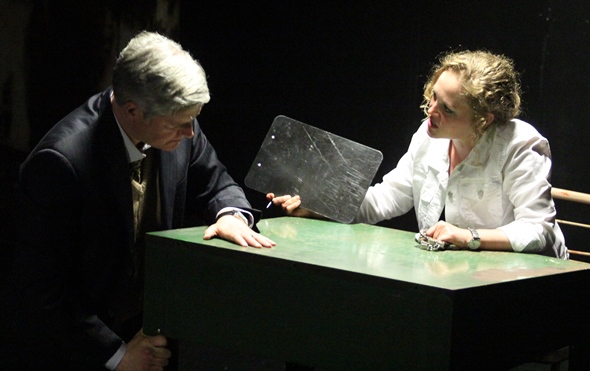‘Wastwater’ at Steep: The human condition, warts and all, with an emphasis on the warts
 Review: “Wastwater” by Simon Stephens, U.S. premiere at Steep Theatre, through Aug. 27. ★★★
Review: “Wastwater” by Simon Stephens, U.S. premiere at Steep Theatre, through Aug. 27. ★★★
By Lawrence B. Johnson
If the mirror held to up to our human lot by Simon Stephens’ play “Wastwater” fairly reflects what’s framed there, we’re not a very pretty collection. We may have our favorable features, but for the most part the image that emerges in “Wastwater,” about to wind up its run at Steep Theatre, is one of frailty, desperation and meanness.
 Wastwater (pronounced Wahst-water) is the deepest lake in England. I suppose that makes Stephens’ title metaphorical since the play has no specific connection to the lake – and the more so when one adds the bit that merry England’s large and profound pond is famous for its absence of oxygen. A couple of people have died in it, each famously turning up years later in splendid corporeal shape, as if preserved in wax — a phenomenon attributed to the lack of oxygen.
Wastwater (pronounced Wahst-water) is the deepest lake in England. I suppose that makes Stephens’ title metaphorical since the play has no specific connection to the lake – and the more so when one adds the bit that merry England’s large and profound pond is famous for its absence of oxygen. A couple of people have died in it, each famously turning up years later in splendid corporeal shape, as if preserved in wax — a phenomenon attributed to the lack of oxygen.
But Stephens’ play is not about that; it’s about living souls, pairs of them captured in a series of three scenes loosely interconnected – and directed here with chilling detachment by Robin Witt. While the latter two episodes are quite affecting, the first is remarkably benign – a setup chapter involving a middle-aged woman (played by Melissa Riemer) and a young man (Joel Boyd), who chat on in the random way of two people who are about to part, perhaps for good, and don’t really know what to say to each other.
She could be his mother, but she is not. We gradually come to understand that the young man is the latest of many who have found hope under her roof, and that while the woman has formed stronger bonds with some than with others, the relationship always ends – must end – with such a parting. This is a place of recovery for addicts. They always say they’ll be in touch, even come back, but they never do. There is tenderness here, sad resignation on her part, impatience on his: Resurgent life awaits.
 So much for passivity, so much for the brighter robes of the human comedy. The second episode presents a sharply different encounter, between a young man (Nick Horst) and a somewhat older woman (Kendra Thulin). This is a tryst, a sexual encounter at a cheap hotel near the airport. Did they meet in the lounge? Are they both travelers? Is she a hooker? It doesn’t really matter.
So much for passivity, so much for the brighter robes of the human comedy. The second episode presents a sharply different encounter, between a young man (Nick Horst) and a somewhat older woman (Kendra Thulin). This is a tryst, a sexual encounter at a cheap hotel near the airport. Did they meet in the lounge? Are they both travelers? Is she a hooker? It doesn’t really matter.
Essentially, the scene unfolds as the woman’s monologue, with the man serving as interlocutor. She is, or was, a drug addict. (Yup, she’s an alum of the aforementioned cleansing house.) Drugs led her down a path she never could have foreseen. How does a girl pay for her increasing appetite for the stuff? You’re right. And yet you may not have it entirely right.
Thulin’s narrative is riveting, and so is her almost contradictory shyness as she and this lad edge toward the thing they’ve come here to do. She’s a complicated lady, and deeply melancholy – deep as the night, deep as that lake. The sex is not enough. She’s looking for sex-plus. But the idea of that specific thrill takes the young man aback; indeed, it would take him to a new place. Whoa. No. No way. He could never do anything like that. But what’s the expression? Don’t knock it till you’ve tried it.
 We leave these mournful lovebirds for tableau No. 3, which may be the single most harrowing scene I’ve ever witnessed in a theater. It’s set in an empty warehouse near an airport. A middle-aged white guy (Peter Moore) is about to take possession of an African child whom he and his wife have acquired by circumventing legitimate adoption procedures. In other words, they’ve purchased the child. From very bad people.
We leave these mournful lovebirds for tableau No. 3, which may be the single most harrowing scene I’ve ever witnessed in a theater. It’s set in an empty warehouse near an airport. A middle-aged white guy (Peter Moore) is about to take possession of an African child whom he and his wife have acquired by circumventing legitimate adoption procedures. In other words, they’ve purchased the child. From very bad people.
But this feckless schlepp has no idea who he’s dealing with. Also, he’s waffling on the deal. Now, in this abandoned place, he comes head to head with the organization’s point person, a woman (Caroline Neff) who quickly proves to be evil incarnate. Neff is just plain scary as she grinds her customer into the floor, lest he entertain any thought of reneging. Anybody tells you they watched this bad dame work over her mark without squirming, they’re lying.
Oh, yeah. The little lady did a stint at the drug shelter, too. She’s mentioned in the first scene, and not in a good way.
Related Link:
- Performance location, dates and times: Details at TheatreInChicago.com
Tags: Caroline Neff, Joel Boyd, Kendra Thulin, Melissa Riemer, Nick Horst, Peter Moore, Robin Witt, Simon Stephens, Steep Theatre, Wastwater


No Comment »
1 Pingbacks »
[…] Simon Stephens’ ‘Wastwater’ at the Steep: Read about it in Chicago On the Aisle […]